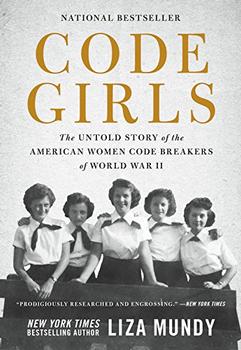Summary | Excerpt | Reading Guide | Discuss | Reviews | Beyond the Book | Readalikes | Genres & Themes | Author Bio

The Untold Story of the American Women Code Breakers of World War II
by Liza MundyCHAPTER EIGHT
"Hell's Half-Acre"
April 1943
Young Annie Caracristi washed her hair with laundry soap. Observing her, Wilma Berryman felt convinced of it. Fels-Naptha, most likely: the strong-smelling bar soap meant for treating stains. You weren't supposed to use Fels-Naptha on your skin unless you had something dire like poison ivy—certainly not on your hair—but some people did, these days. Shampoo, like so many items, was not always easy to come by. The results were not ideal: Annie's hair was thick and curly and flew everywhere. But a tendency to dishevelment only increased Wilma's fondness for her.
Blue-eyed, blond, and good- natured, Ann Caracristi came to work at Arlington Hall each day wearing bobby socks, flat shoes, and a pleated skirt that billowed and swung. She looked like a bobby-soxer, the kind of carefree and heedless college girl who lived for boyfriends and swing dances. But appearances were deceiving. What hidden depths Ann Caracristi had. What capabilities. General Douglas MacArthur did not know it, but his secret weapon—or one of them—was this affable and somewhat cosseted twenty-three-year-old from the upper middle classes of exurban Bronxville, New York. Intellectually ferocious, Annie worked twelve-hour shifts, day after day. The only time she missed work for any time at all was when she came down with chicken pox. She phoned apologetically to say in a tiny, pitiful voice that she could not come in. Wilma Berryman took her some soup.
Annie Caracristi surprised everybody, most of all herself, with her cryptanalytic feats. Though she had been an English major in college, she possessed the mind of an engineer. It was fascinating for Wilma Berryman—the West Virginia schoolteacher who had been one of William Friedman's early Munitions Building hires, now supervising a major unit at Arlington Hall—to see what Annie could do. Nothing the Japanese did could shake her off. Conversion squares, encipherment tables, cleverly cannibalized additive books—Annie was onto all their ruses. So gifted was she that Wilma made Ann the head of her research group. At Arlington Hall, to have a recently graduated female in charge of a key unit was not unusual. It was normal.
Unlike the Navy operation, the Army's c ode-breaking operation at Arlington Hall was polyglot, open-minded, and nonhierarchical. Anybody could be in charge of anything. There was a wide assortment of ages and backgrounds working at its wooden tables. Bespectacled middle- aged men labored alongside p in-curled young women with names like Emerald and Velvet. Which is not to say that there wasn't sexist condescension: One of the bookish men, a New York editor named William Smith, referred to Arlington Hall's contingent of female southern workers as the "Jewels." It was a lofty and rather snide reference to the number of women working there whose parents had seen fit to name them after precious stones. He wasn't wrong: In addition to a profusion of Opals and Pearls, the workforce included a real Jewel—Jewel Hogan— who worked in the machine section. And there was Jeuel Bannister, the band director recruited out of South Carolina.
At Arlington Hall there also were "BIJs," or born-in-Japans, the term for people who grew up in missionary families and worked in the translating section. There was the actor Tony Randall—later famous as Felix Unger in The Odd Couple—clowning around (at one point he danced on a table) as he waited for the intelligence summary to be taken to the Pentagon. There was an extended group of siblings and cousins—the Erskines—who had relocated as a family unit from Ohio. There was Sumner Redstone, the future billionaire media magnate, now a young officer in the translating unit. There was Julia Ward, former dean of students at Bryn Mawr, czar of a well-run library unit. There were nannies, beauticians, secretaries, restaurant hostesses. Josephine Palumbo at eighteen was virtually running the personnel unit, plucked out of McKinley High School in Washington. Tiny Jo Palumbo, daughter of an Italian immigrant laborer, was the person who swore in newcomers, and the sight of her administering the grave secrecy oath had inspired one code breaker to write a lyrical poem in her honor.
Excerpted from Code Girls by Liza Mundy. Copyright © 2017 by Liza Mundy. Excerpted by permission of Hachette Book Group. All rights reserved. No part of this excerpt may be reproduced or reprinted without permission in writing from the publisher.
Silent gratitude isn't much use to anyone
Click Here to find out who said this, as well as discovering other famous literary quotes!
Your guide toexceptional books
BookBrowse seeks out and recommends the best in contemporary fiction and nonfiction—books that not only engage and entertain but also deepen our understanding of ourselves and the world around us.